Introduction
Issue
The rate of ignorance related to the knowledge on geography and history is increasing.
It is a significant problem that can affect the nation in the future.
Importance of the Issue
The limited level of knowledge on geography and geopolitics is demonstrated by American college and university students as:
- future policy makers,
- public administrators,
- and professionals in fields of the national economy and international relations.
The increasing rate of ignorance related to the knowledge on geography and history in American students seems to be a significant problem that can affect the American nation in the future.
This issue is important to be discussed because the limited level of knowledge on such basic facts as the location of the country in the world and states in the USA is demonstrated by future policy makers, public administrators, and professionals in fields of the national economy and international relations.
Today, the low level of knowledge on general historical, political, religious, scientific, administrative, and world issues is typical for American college and university students.
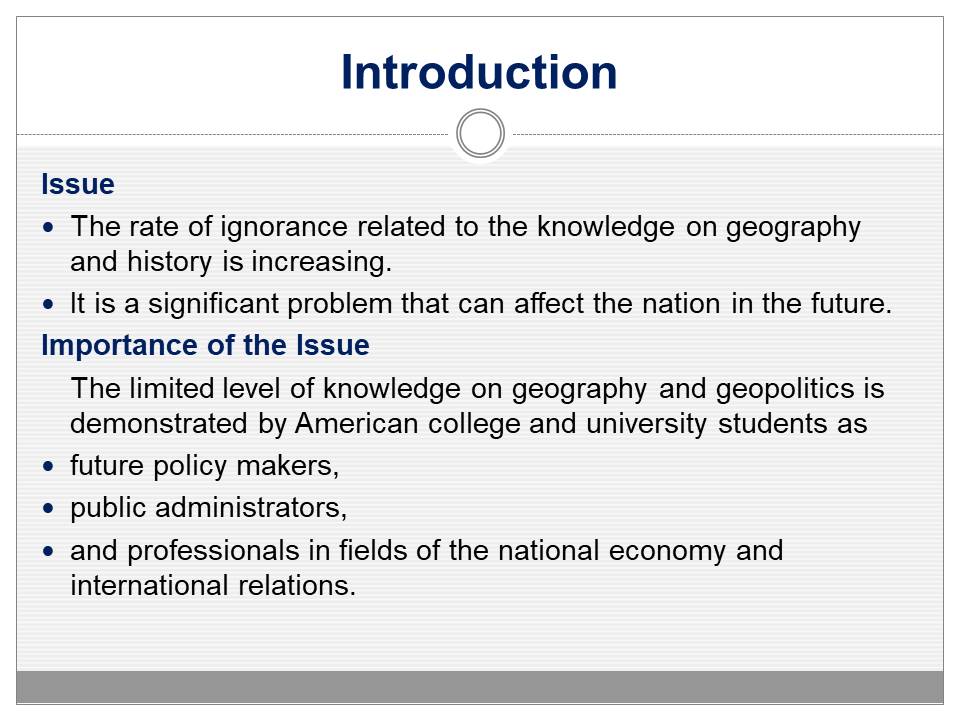
Primary Data Related to the Issue
More than 60% of American students face difficulties identifying their country on the world map and states on the map of the USA (National Geographic).
The majority of students cannot indicate the location of Iraq, the UK, Japan, and the African continent on the world map (“Interview with Harm de Blij”; National Geographic).
About 35% of American students do not know the words of the national anthem (Stone).
The majority of students cannot remember the name of their state governors, senators, and congressmen (Stone).
The general level of ignorance and level of the geographic illiteracy tend to increase among young Americans.
The National Geographic survey demonstrated that more than 60% of American college and university students face difficulties identifying their country on the world map and their states on the map of the USA.
The majority of students cannot indicate the location of such countries as Iraq, the UK, and Japan on the world map as well as the entire African continent.
About 35% of students in American colleges and universities cannot sing the national anthem.
In addition, many American students cannot remember the name of their state governors, senators, and congressmen.
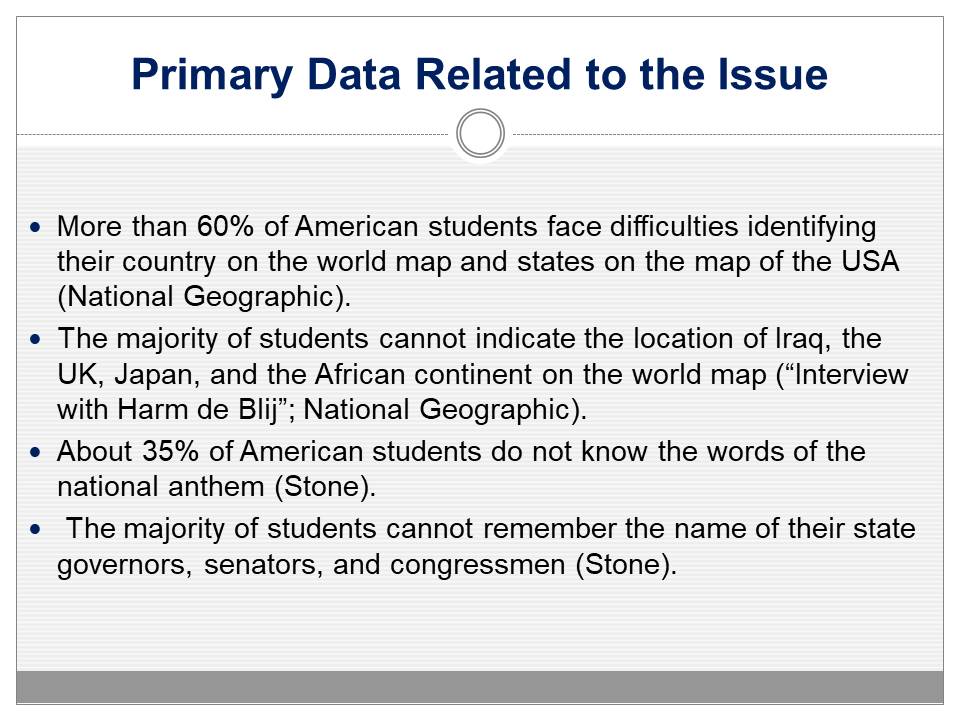
Scholars’ Opinions on the Issue
According to Fingeret, exceptionalism and isolationism are the causes of the issue development (Fingeret 134).
Exceptionalism and isolationism are reflected in the materials used by instructors to teach students.
Eve, Price, and Counts note that instructors and students often ignore the importance of different parts of the world to be studied in the class (Eve, Price, and Counts 409).
There is a low level of awareness of international and geopolitical matters in American students (Fingeret 135).
Scholars argue that the issue of ignorance is caused by a number of factors.
Fingeret determines exceptionalism and isolationism as the causes of the issue development (Fingeret 134). These aspects are reflected in the materials used by instructors to teach students.
The American education system cannot help young people in developing their knowledge on geography and history adequately. Instructors and students are inclined to ignore the importance of different parts of the world to be discussed in classes (Eve, Price, and Counts 409).
There is also a low level of awareness of international matters in American students, and they ignore focusing on issues in the spheres of geopolitics or international relations (Fingeret 135).
If changes in the educational system and social policies are not made, future generations of Americans will be illiterate regarding the geographic, historic, and social questions.
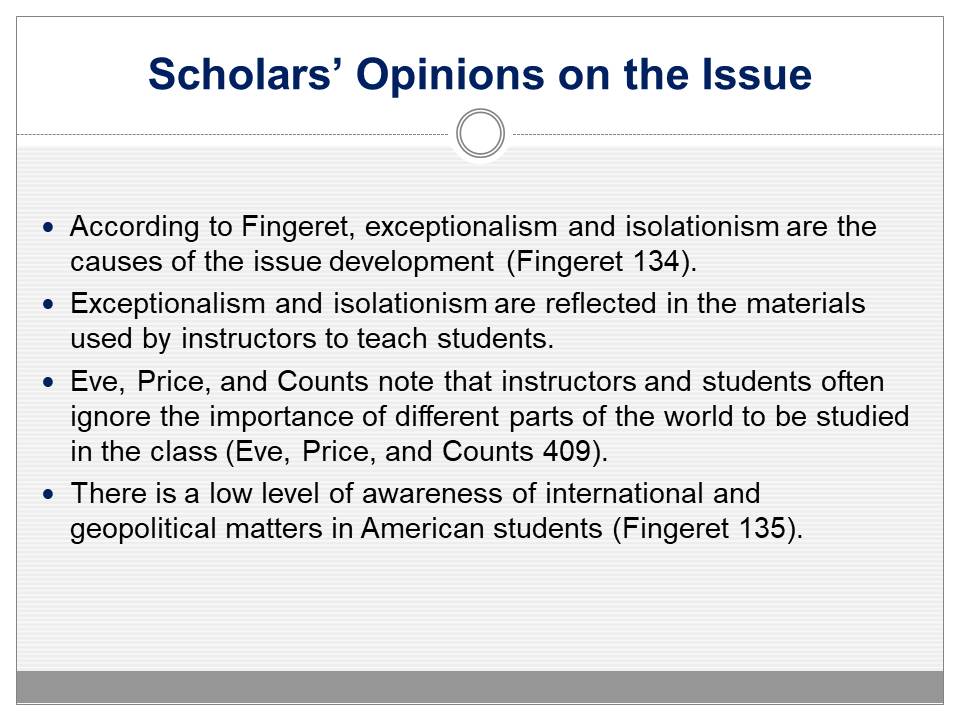
Repercussions of the Geographic Illiteracy
Consequences of the increasing rate of ignorance related to general geographic, historic, and political issues are the impossibility:
- to develop as the major economic and military power in the future;
- to understand changes in the local and world geopolitics;
- to use advantages of innovations and technologies for the progress;
- to compete in the world regarding the quality of education offered to young generations.
The dramatic consequence of the increase in the rate of ignorance is the impossibility for the nation to develop as the major economic and military power in the world.
To understand changes in the local and world geopolitics and be able to use advantages of innovations and technologies for the progress, students need to increase their level of literacy regarding general geographic, historic, and political issues that are closely connected.
Most nations in the world work to increase the level and quality of education offered to their young generations in the context of global and national programs.
The long-term effect of such processes is that American professionals will be less competent in foreign relations and geopolitics than young professionals in other countries.
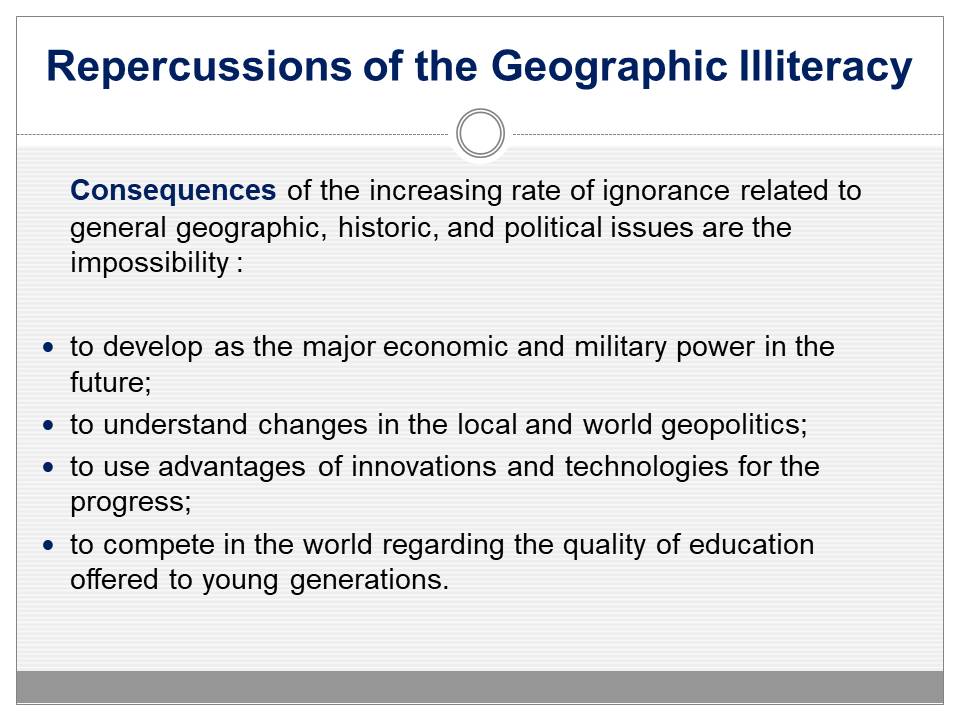
Solution to the Issue of Ignorance
The issue of the geographic illiteracy can be resolved while:
- focusing on changes in the American educational system;
- improving educational approaches to developing geographic literacy;
- avoiding the loss of development opportunities for Americans.
This approach will help in avoiding a possible knowledge crisis in the future.
The issue of the geographic illiteracy and general ignorance can be resolved with the focus on changes in the American education system.
Improvements in educational approaches to developing geographic literacy are important to avoid losing development opportunities for American public administrators in the future.
This approach will help avoid a possible knowledge crisis in the future.
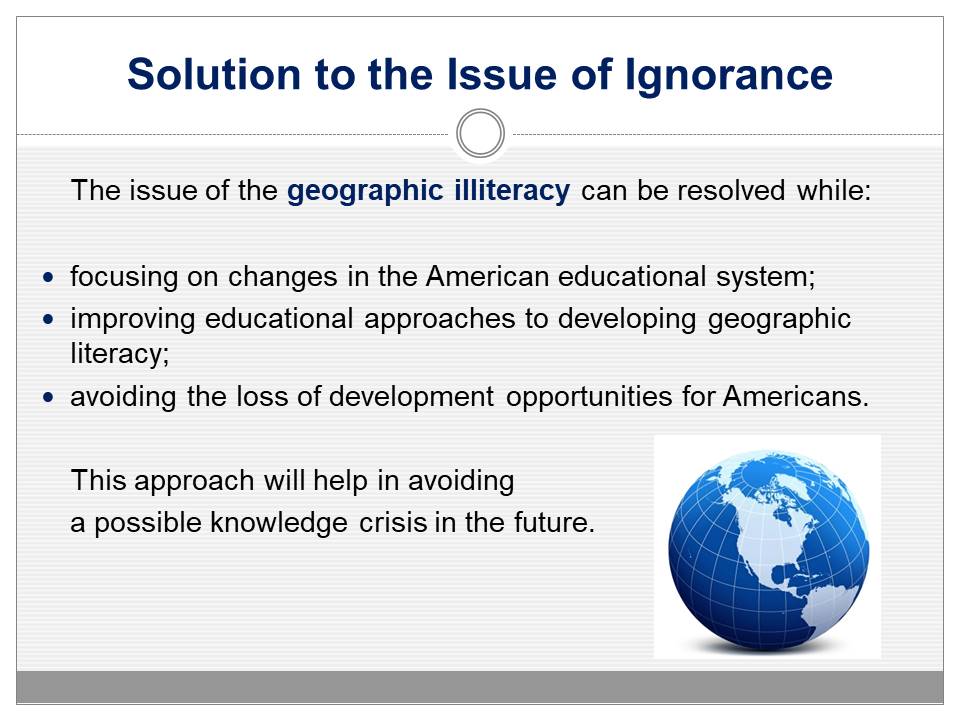
Possible Alternatives
- I – Revise the curriculum content and its design in such subject areas as geography, history, and international relations.
- II – Introduce general courses on geopolitics and international relations in American colleges and universities during the first and second years of study.
- III – Monitor the media content, especially of educational programs and news.
- IV – Monitor the content of teaching materials and resources used in schools, colleges, and universities.
The additional monitoring of the students’ progress on these subjects can be proposed.
Possible alternatives to address the issue are numerous.
First, it is important to revise the curriculum content and its design in such subject areas as geography, history, and international relations.
Second, American colleges and universities should be required to introduce general courses on geopolitics and international relations during the first and second years of study, and the additional monitoring of the students’ progress can be proposed.
Third, the media have also played a significant role in reducing the level of knowledge among the young Americans, and it is important to monitor the media content, especially of educational programs and news.
Fourth, it is important to monitor the content of teaching materials and resources used in schools, colleges, and universities.
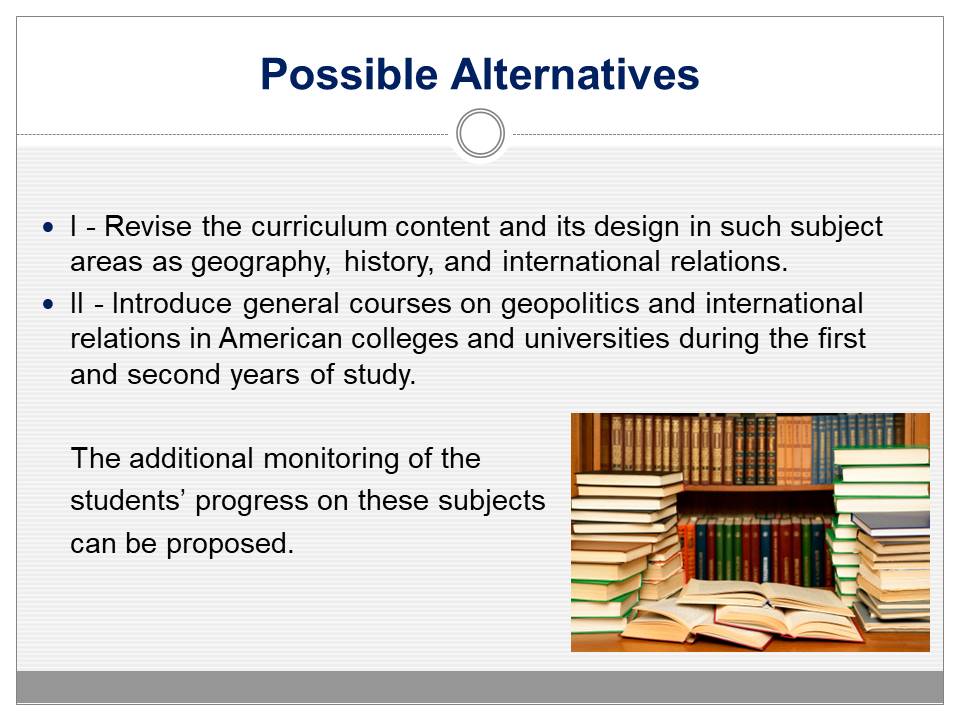
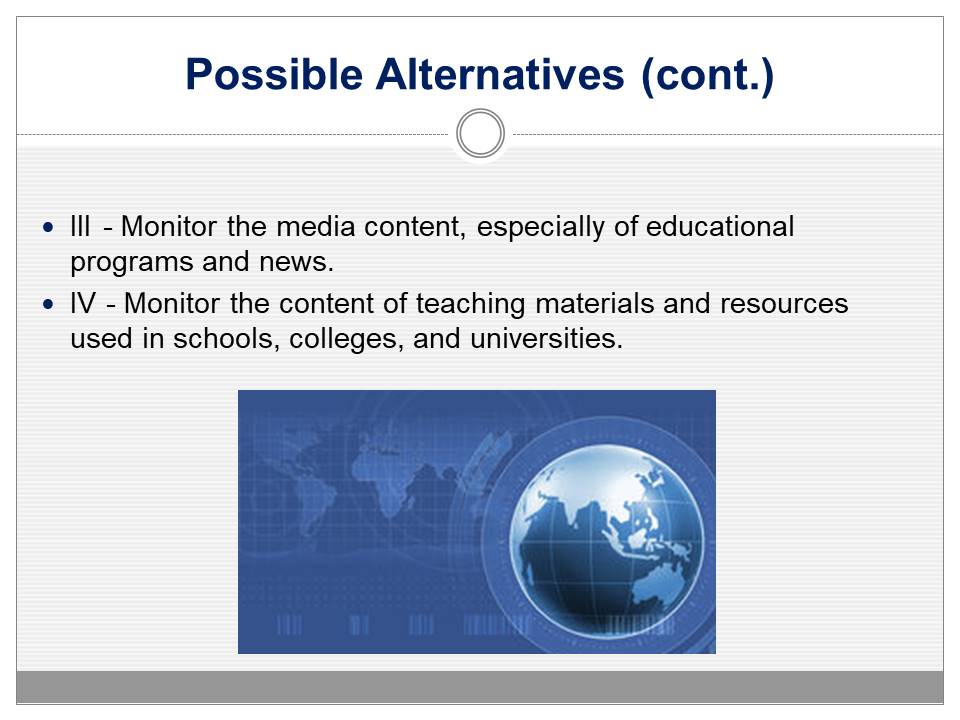
Conclusion
Taking appropriate actions to solve the problem of geographic illiteracy, it is possible to prevent the future generations from losing their high position at the international arena.
Individuals with the little knowledge on geography, and history are less competent in making decisions.
The reformation of the American educational system at the local, state, and federal level is important.
To address the issue of the students’ geographic illiteracy, it is important to take appropriate actions to solve the problem and prevent the future generations from the shame of losing their position at the international arena because of ignorance and incompetence.
Individuals with the little knowledge on geography and history as well as on national, regional, and international matters are less competent in making decisions, especially in public and business administration.
The reformation of the American educational system at the local, state, and federal level is important to address the identified issue.
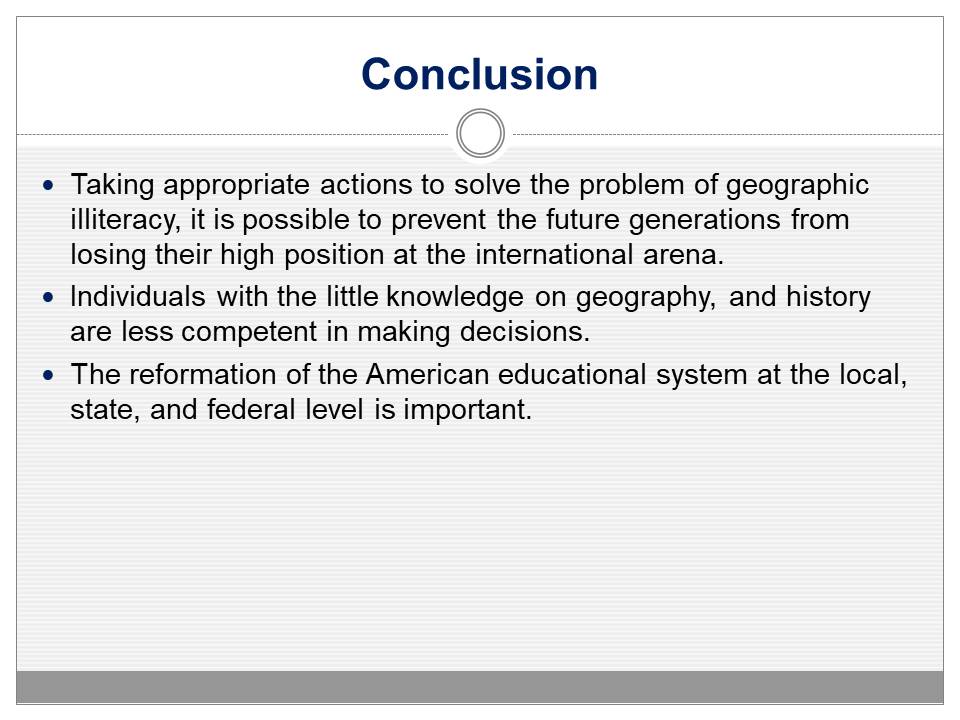
Works Cited
To address the issue of the students’ geographic illiteracy, it is important to take appropriate actions to solve the problem and prevent the future generations from the shame of losing their position at the international arena because of ignorance and incompetence.
Individuals with the little knowledge on geography and history as well as on national, regional, and international matters are less competent in making decisions, especially in public and business administration.
The reformation of the American educational system at the local, state, and federal level is important to address the identified issue.